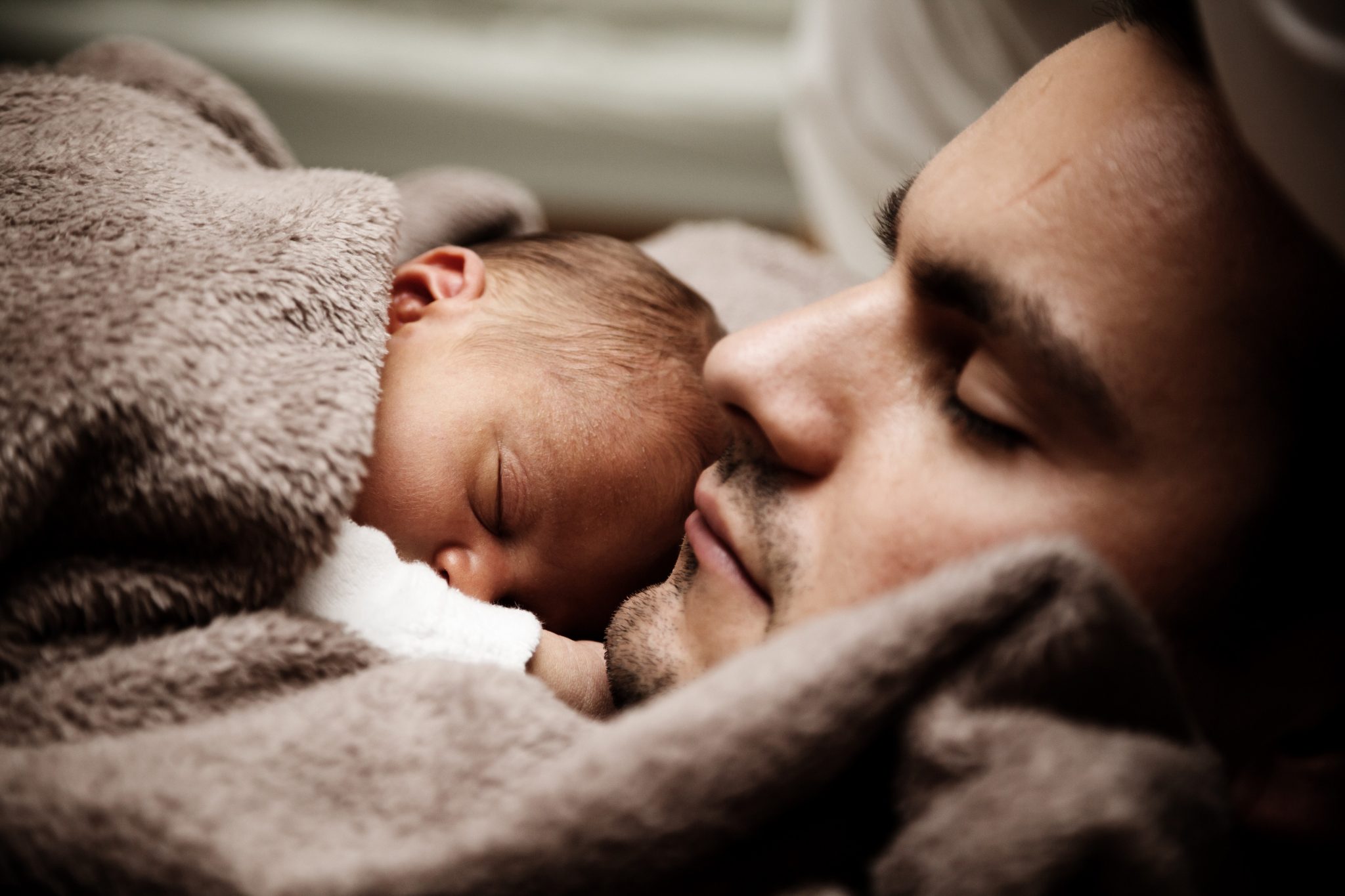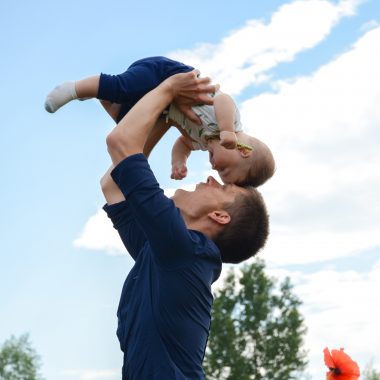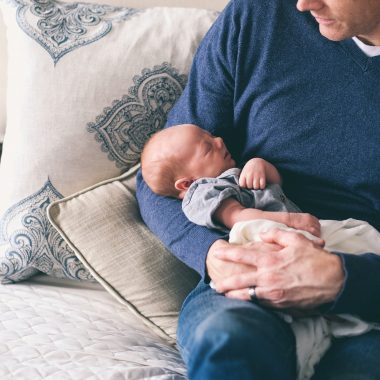- What to Expect for First Time Dads?
- 1. There is a chance that dad might not bond with baby right away.
- 2. They are babies and they don’t know any better.
- 3. Don’t go overboard with buying things.
- 4. You will be tired and exhausted as a first time dad.
- 5. You will be pooped and peed on.
- 6. Being a dad, you have to be there as much as you can.
- Pregnancy for First Time Dads: What to Expect?
- First Time Dad Tips During Pregnancy
- Labor for First Time Dads: What to Expect?
- Step 1: Do your research about labor
- Step 2: Know what to expect for the different stages of labor
- Stage 1: Early Labor
- Stage 2: Active Labor
- Stage 3: Delivery
- Post-Labor Duties
- Dad 101: How do First Time Dads Prepare?
- 1. Understand how to use a baby car seat
- 2. Have your finances planned
- 3. Talk about baby duties with your partner
- 4. Prep some freezer meals before baby’s arrival
- 5. Clean and organize the house before baby comes
- 6. Be intimate with partner
- Key Takeaway: Do your Part
- Things a First Time Dad Should Know: From Dads to Dads-to-be
- You have to know what to do what the baby
- Understand baby sleep
- Things to know about your partner
- You might not bond with baby right away
- Keep puppy pads on hand when changing baby
- Know that all babies are different
- First time Dad Depression
- Symptoms of first time dad depression (PPPD)
- Causes of Paternal Depression
- Paternal Depression is very real: What does it mean?
- Is it normal for new fathers to feel depressed?
- First Time Dad Anxiety
- First Time Dad Questions and Answers
- How do I change my baby’s diaper?
- Solution:
- How do I make my baby stop crying?
- Solution:
- What does breastmilk taste like?
- Answer:
- How do I bond with my baby?
- Solution:
- When will baby go to sleep?
- Solution:
- How do I help my partner going through postpartum?
- Solution:
- How do I deal with emotional self-care as a dad?
- Solution:
- Do things get easier with baby?
- Solution:
- What to Expect for First Time Dads?
- 1. There is a chance that dad might not bond with baby right away.
- 2. They are babies and they don’t know any better.
- 3. Don’t go overboard with buying things.
- 4. You will be tired and exhausted as a first time dad.
- 5. You will be pooped and peed on.
- 6. Being a dad, you have to be there as much as you can.
- Pregnancy for First Time Dads: What to Expect?
- First Time Dad Tips During Pregnancy
- Labor for First Time Dads: What to Expect?
- Step 1: Do your research about labor
- Step 2: Know what to expect for the different stages of labor
- Stage 1: Early Labor
- Stage 2: Active Labor
- Stage 3: Delivery
- Post-Labor Duties
- Dad 101: How do First Time Dads Prepare?
- 1. Understand how to use a baby car seat
- 2. Have your finances planned
- 3. Talk about baby duties with your partner
- 4. Prep some freezer meals before baby’s arrival
- 5. Clean and organize the house before baby comes
- 6. Be intimate with partner
- Key Takeaway: Do your Part
- Things a First Time Dad Should Know: From Dads to Dads-to-be
- You have to know what to do what the baby
- Understand baby sleep
- Things to know about your partner
- You might not bond with baby right away
- Keep puppy pads on hand when changing baby
- Know that all babies are different
- First time Dad Depression
- Symptoms of first time dad depression (PPPD)
- Causes of Paternal Depression
- Paternal Depression is very real: What does it mean?
- Is it normal for new fathers to feel depressed?
- First Time Dad Anxiety
- First Time Dad Questions and Answers
- How do I change my baby’s diaper?
- Solution:
- How do I make my baby stop crying?
- Solution:
- What does breastmilk taste like?
- Answer:
- How do I bond with my baby?
- Solution:
- When will baby go to sleep?
- Solution:
- How do I help my partner going through postpartum?
- Solution:
- How do I deal with emotional self-care as a dad?
- Solution:
- Do things get easier with baby?
- Solution:
First of all, congratulations on being a new dad! You have come to the right place.
Being a first time dad can be an exhilarating experience – with its ups and downs. it is a time of many firsts; some that will be cherished for years to come and…. some not so much.
With that being said, this detailed article will be your guiding light in your journey of fatherhood. For the first time dads reading this, this will be your bible for navigating through the joys and the pitfalls, and we are sure you will find a lot of useful information.
What to Expect for First Time Dads?
A lot of this advice is written retrospectively from dads who were in the same position as you; they were about to become dads for the first time. But this advice also comes from fathers who are navigating the whole process as they go.
So, lets get into what first time dads should expect:
1. There is a chance that dad might not bond with baby right away.
This is something that is experienced by a lot of first time dads, and it is something that can be frustrating and upsetting.
Bonding tends to come easier to mamas, and they are attached to baby before it even arrives. Dads, on the other hand, go through different emotions when baby arrives which revolve more around an overwhelming sense of responsibility.
While this gets better as time goes on, it is important for dad to really spend time with his baby to strengthen/build the bond. Being more involved in actively taking care of baby will help surge oxytocin levels which facilitates the bonding.
If you are a first time dad that is struggling to bond with your infant, talk about this with friends or relatives who have gone through the same thing as you. Chances are they experienced the same thing as well.
2. They are babies and they don’t know any better.
This should go without saying but it is still important to be written explicitly. It is easy to forget that your infant is just a baby as first time dad because you have never dealt with a baby like this before.
In moments when you find yourself feeling frustrated with babies crying (that feels like it’s never going to end) or them not eating, sleeping properly, remind yourself that your infant is just a baby.
Similar to you, this is their first time too! Everyone is learning.
3. Don’t go overboard with buying things.
As a first time dad, you will want to buy anything that you feel like could be remotely useful with the baby. But you need to practice restraint here, otherwise before you know it, you will have closets full of gadgets and gizmos that will never be touched again.
Before you buy something, make sure to really think about its function rather than how it looks. Think about how much it will be used, and if you are likely to get a good return from it.
Toys and electronics can also be very expensive, so this advice is good if you are looking to be budget oriented.
4. You will be tired and exhausted as a first time dad.
This is inevitable. Taking care of a newborn involves a lot of sleepless nights, and round the clock caring.
These situations will be potential moments of weakness where you feel like you are a bad parent, and were not cut out for this.
In these moments, it is important to remind yourself that you are just really tired and this is as new to you as it is for the baby. Everything is new for an infant, and it is incredibly overwhelming to experience so many new and different things at once.
Remind yourself that this is a phase, and it will not last forever and that you have to power through for your sake and your family’s sake.
5. You will be pooped and peed on.
This, also, is inevitable. You can try to delay it as much as you can, but it will happen which is why you have to mentally prepare yourself.
In order to deal with this, just make sure you have a stash of clothes that you simply don’t wear around the house and save it for work or when you have to go outside.
6. Being a dad, you have to be there as much as you can.
Your partner has been through a lot, and is going through a lot too. She has not only given birth, but she is also recovering which can be stress inducing on its own.
Chances are you get to go out for work, and that is an 7-8 hour break from the crying, messes, and more. But mama doesn’t, which is why you need to be extra considerate and do as much as you can to be there and help out.
Be kind and gracious to one another, and work as a team.
Pregnancy for First Time Dads: What to Expect?
When couples’ say “We’re expecting!”, that is completely true. Both, mama and dad, are having a baby together. Yes, your partner is the one carrying the child but there is a lot more to pregnancy than just the physical aspect of it.
First time dads need to be there to experience the emotional aspect of pregnancy, which is something that is supposed to be shared by both parents.
Here are some things that first time dads should expect during the pregnancy journey:
- Being emotionally and physically present. Pregnancy entails a lot of things, such as doctor’s appointments, baby shopping, deciding on names, and just a lot of planning in general. Being a first time dad, you have to ensure that you are present for all of these things. It is just as important than you emotionally engage with your partner as you are there physically. Having a baby together for the first is a beautiful experience, and you should take in every moment of it.
- Dealing with anxiety. Anxiety is one of the symptoms dads experience during pregnancy. (Yes, dads get pregnancy symptoms too!) It is only natural, you are going to be responsible for another human, which is a lot. First time dads should expect anxiety to creep in every now and then, and when this happens they should deal with this by talking about it with their partners, or other first time dads who were in the same position as you.
- Be informed. An other way how you can stay engaged with your partner and the pregnancy is to keep yourself informed about what’s going on. You can do this by attending the doctor visits, or doing research on your own time. Keep yourself updated about baby’s development, and how you can ensure a healthy pregnancy and delivery.
- Changes in lifestyle. As a first time dad, you can expect some changes to be made in your lifestyle in order to be more prepared for baby’s arrival. Your partner should ideally adapt a healthier lifestyle so that both pregnancy and delivery are easier. This might involve eating healthier, doing more physical exercise. Doing these things together will make the transition easier on both of you.
- An increased workload. Your partner is carrying a baby, and while she will capable of doing most things, her mobility might be restricted in the later weeks of pregnancy. As a first time dad, you will have to be more proactive and take initiative to do more than you already do. This can involve house chores, errands, etc, things that your partner was doing previously. If there is anything you can do to make things easier on your partner, simply do it!
During pregnancy, first time dads should simply expect to be there for their partners as much as they can. This might involve some adjustments in schedules and lifestyle. It is also a time of many firsts, so dads-to-be can expect to do a lot of celebrating for minor and major milestones.
First Time Dad Tips During Pregnancy
Here are some first time dad tips that will be helpful during the pregnancy period:
- It is okay to feel anxious about the new member of your family. Remember, that you have a couple of months to get used to the whole idea, and you should take this time to take it all in.
- Spend as much time with your partner as you can. Aside from the doctor appointments and baby related things, you should try to schedule as much one-on-one time as you can because things will get crazy when baby comes and most of your time will be given to the baby.
- Yes, your life will change. But this doesn’t mean that you won’t have time for anything that is important to you. You might notice yourself caring less about certain things because they aren’t that important to you anymore.
- Do as much research as you can, and this will help you feel more confident about the whole process and baby’s arrival. There are many resources that you can use – from books to Youtube videos – and you should definitely make the most of them.
- It is highly likely that whatever you are feeling, is something that another first time dad has experienced. So it is better to talk about what you are going through because you are not alone.
- As a first time dad, it is important to not take things personal. Your partner is going through some serious changes, physically and mentally, which will affect her mood. Deal with these changes in a patient and loving way.
- Try not to buy every gadget/toy you think could be useful for baby because chances are, it won’t.
Labor for First Time Dads: What to Expect?
A lot of first time dads absolutely don’t have an idea as to what the should expect during labor. Labor is a very emotionally and physically stressful time for the mama, and the most important the dad can do is to be completely present and offer support.
But in order to be fully there, first time dads should know what they have to expect. We will be breaking down the labor process into simple steps so that first time dads are better prepared:
Step 1: Do your research about labor
The first step to ensure that you are fully prepared, you have to do your research about the process of labor. Yes, you have a good idea about what you should expect, but that is not enough.
You can either join a birthing class with your partner that will really break the process down for you and you will know exactly what to expect and do each step of the way.
If you can’t join a birthing class, then you must do research about it in your own time. Read as many articles and books as you can, watch videos, and ask questions to people who have already passed this process.
Doing your research is important because you will be able to recognise when your partner is going into labor. Once you know what to expect, you will be more informed and cautious for any potential signs and symptoms that are not normal as well.
It will be highly reassuring for your partner knowing that you are fully prepared and know what to expect when she goes into labor.
Seriously, the last thing she will want to hear from dad is “What can I do??“.
Step 2: Know what to expect for the different stages of labor
There are three main stages of labor that a first time dad should know about so he knows what to expect. There is early labor, active labor and then the delivery itself.
Stage 1: Early Labor
In this phase, your partner will be experiencing mild contractions that will be spaced out around 20 minutes, and should last between 30 to 40 seconds.
The early labor stage can last anywhere between a couple of hours to even days. Your partner may experience symptoms like:
- Backaches
- Cramps
- Indigestion
- Blood tinted discharge
In this stage, as the dad, your job is to make sure that your partner stays calm and relaxed. She has to save her energy and strength for the next stages of labor, and that is something you will have to ensure.
Try to keep her anxiety at bay, and keep an eye on the contractions.
Stage 2: Active Labor
In this stage the contractions will become more intense and more frequent and will last longer for about 40 to 60 seconds, ever 3 to 4 minutes.
In the active labor stage, your partner will be experiencing:
- Contractions that are a lot more painful and uncomfortable
- Increased back pain
- Fatigue and tiredness
- Legs feeling heavy
Things will start to move faster in this stage, and it will also get a lot more intense. Your partner will be in a considerable amount of pain and feelings of excitement and nervousness will continue to escalate.
Your job, as the dad, is to make sure your partner is as comfortable as she can be. You can give her back rubs, ice chips to chew on and ask her to start her breathing exercises.
The breathing exercises will help her get through the contractions and calm her nerves so you can work on those with her. Make sure she’s hydrated and has something to munch on if she’s hungry. This is also the time to get an epidural if it is required, so dad can also ask mama about that.
Soon enough, the active labour will transition into being more advance as the cervix dilation increases to the final 10 centimeters.
Stage 3: Delivery
This is the last and the most demanding stage of the labor process, and it is also the shortest one.
Your partners contractions will pick up super quickly, and will be a lot more concentrated. In this stage, your partners physical pain will become a lot more amplified, and she will be experiencing:
- A sharp pressure in her lower back and her rectum,
- cramped legs,
- body jitters and chills,
- drowsiness and fatigue in between contractions
The good news is baby is almost here, and mama just has to power through!
Being the dad, your partner’s support system, your job is to speak kind words of encouragement (if she likes) and remind her that it will be over soon. This is the stage where she will need you the most.
Once dilation has reached the full 10 cm, your partner will be asked to start pushing the baby out. At this point, encourage your partner to push and let her know that she is doing an amazing job and baby is almost there. Make sure to leave out the graphic details, she doesn’t need to know that now.
Once baby is out, the placenta will also be delivered shortly after which you will be given the task to cut the umbilical cord and it will be upto you if you want to take care of that.
There will be a quick period, where baby is taken to the neonatal unit, and your partner is cleaned and patched up.
Post-Labor Duties
Dad will get some time with baby before mama is ready to hold them. At this stage, dad can make the calls and inform loved ones that baby has been delivered, and about the rest of the baby statistics (height, weight, gender, etc).
The time you get with your baby, as a first time dad, is for you to practice skin-to-skin contact and just really soak in your first moments with your baby.
After a while, your partner will ask to see baby and this is when you will have some time together as a family. Let your partner know she did amazingly, and also let her have some time alone with baby while you stay on stand-by.
Dad 101: How do First Time Dads Prepare?
Embracing fatherhood is no small feat. It can be quite the rollercoaster from the moment you find out that you are going to be a dad for the first time ever.
You will want to be as prepared as possible before the arrival of the baby, which is a great thing. However, no matter how much you do you might not feel fully prepared.
In this section of the article, we will touch base on things that you should definitely sort out as an attempt to prepare for baby’s arrival because these are things that are normally not thought about.
1. Understand how to use a baby car seat
These tips are in no chronological order, but this is a very important thing that is often overlooked.
Once you get a car seat, make sure you know the ins and outs of it and thoroughly practice using it with a stuffed toy. You will be bringing back your newborn in this car seat, and it is important that you understand fully how it is supposed to work.
Trust us when we say, the last thing you want is to fidgeting with the car seat while your partner is waiting with the baby.
2. Have your finances planned
Most first time dads feel overwhelmed because they begin to doubt their financial soundness. It is okay if you feel this way, because it is a very normal feeling.
In order to address these concerns, you should really sit down and plan your finances with your partner and work out a budget for baby-related things.
Once you realize that things will work out, you will feel more confident about baby’s arrival.
3. Talk about baby duties with your partner
If baby duties are not fairly divided between both parents, it can cause a lot of frustration and, possibly, resentment between the parents.
This is a talk that both first time parents need to have before the arrival of baby. It will give you both a chance to talk about different tasks, and who should handle what.
The tasks don’t just have to baby related, you can also discuss the division of house chores, etc.
The point of this conversation is to have a plan laid out so both of you feel not only prepared, but can also get enough sleep and breaks possible.
Remember, team work makes the dream work!
4. Prep some freezer meals before baby’s arrival
Yes, you will have help from friends and family who will be bringing in food for you, but is also important to have some freezer meals prepped too.
After baby comes, no one is going to have the time to cook. And you can only get so much take-out and order in before you start getting sick of it.
Find some recipes that are easy to prepare and are also freezer friendly to make life easier for future you!
5. Clean and organize the house before baby comes
Just like cooking, parents will be less likely to clean as well after the arrival of the baby. A good deep-clean makes a lot of sense as it will keep things tidy for a couple of weeks.
Organizing the house is just as important because you want to get rid of things that are clutter and are taking up space. Babies may be small, but don’t underestimate the amount of stuff that can accumulate because of them.
6. Be intimate with partner
Whether it is a weekend-long getaway, or date nights, plan these things out and do them as much as you can. After baby comes, you won’t have enough time for each other to be intimate, which is why you have to make the most of your time during the pregnancy period.
Physical contact or spending quality time will not only help you two feel closer to each other, but it will also reduce the baby stress significantly.
Key Takeaway: Do your Part
In the end, it is important to do as much as you can that will make things easier on your partner and also help build the bond with baby. But it is also wise to know that no matter how much you prepare as a first time dad, you will encounter things that you didn’t account for and that is okay.
Baby steps are the way to go.
Things a First Time Dad Should Know: From Dads to Dads-to-be
You come across a lot of articles and forum posts that usually have some great gems of advice for first time dads. These posts and articles are extremely helpful as they make you realize that you were/are not the only one who went through something like this.
Not only are they comforting in a way, it also gives first time dads the chance to learn from certain mistakes that were made by another dad somewhere else in the world.
Without further adieu, here are some things that a first time dad should know according to veteran first time dads:
-
You have to know what to do what the baby
This may sound strange, but a lot of first time dads are nervous around newborns because they don’t know what to do with them. We understand that infants are fragile creatures and that can be quite scary.
But this is something that you need to get over before baby arrives. If you know someone who has a baby that is a couple months old, ask to take care of that baby. Learn about the right ways to hold the baby, change them and feed them.
A lot of first time dads also struggle with knowing what to do with their baby. A newborn doesn’t do much so it is okay if you are confused about how you can spend time and bond with them. Here are some things that you can do with an infant:
- Practice skin-to-skin contact by letting baby baby on your unclothed chest. This is extremely important in building a bond with baby.
- Talk to them. Seriously, do it. Tell them about your day, the plans you have for the weekend, any concerns you may have and most important how happy you are.
- Feed baby. This will not only give your partner a break, but it is a great way to just spend some one-on-one time with baby.
-
Understand baby sleep
Baby sleep is quite a different beast that you will have to deal with. It is also something that you will struggle with as well, but it won’t be a permanent thing. Here are some things that you should be aware of so they don’t take you by surprise:
- While newborns usually sleep for 2 to 3 hours at a time, it is also normal if their nap times are shorter than this. Any thing more than 3 hours is when you should get concerned because newborns need to feed a lot in order to gain weight and sustain their speedy growth, which is why they have to woken up.
- Infants don’t have an established cicardian rhythm which is the body’s internal clock that tells you when it is day and night. Basically, newborns have no concept of time yet which is why they won’t care that “it’s night night, and mama and dada need to sleep”.
- You will need to be patient to get used to baby’s sleeping habits, but here are some things you can do to help:
- Try the 5 S method: Swaddle, shush, swing, lay them on side, let them suck on something. This methods tries to mimic how baby was in the womb, which is how they were comforted the past 9 months.
- Play white noise. Get a white noise machine or download an app.
- Check if they are hungry, if their diaper needs changing, if they need to be burped or if they are hot/cold.
- Your baby will go through sleep regressions, where their sleeping patterns change because they are going through a growth spurt. Don’t worry, it will be okay soon, it is the matter of baby adjusting.
-
Things to know about your partner
Your baby’s mother has been through a lot, physically and mentally, and she will continue to go through physical and mental changes for the next couple of months as her body is becoming used to not being pregnant anymore.
This is going to be very difficult for her, and on top of everything she also has to be a mother to your newborn.
While you might think that things are crazy for you, mama is going through a lot more. This is why you need to step up and do anything you can to make things easier on her, and ensure that she is getting as much rest and sleep as she can.
Be as kind, gracious and affectionate to your partner as possible, and know that this period can involve a lot of giving and not much receiving.
-
You might not bond with baby right away
It might not be a magical, love at first sight type of situation for you when you see your infant for the first time, and that is normal.
Many dads go through this, and it just requires an extra bit of effort to build that bond but it will happen.
It is important to talk about these things with a friend, family member or even your partner. Having a baby can be a very emotional time, and its better to talk about what you are feeling instead of bottling it up.
-
Keep puppy pads on hand when changing baby
In the beginning, when you are getting used to changing diapers, you can lay down some puppy pads to minimize the potential mess.
They are quite cheap, available in bulk and can really help with diaper changing.
-
Know that all babies are different
Every baby is different, which means that what worked for some parents may or may not work for your baby.
If someone else’s baby is sleeping soundly, or is reaching milestones quicker than yours doesn’t mean there is something wrong with your parenting.
Keep this in mind when you are bombarded with advices, and “fool-proof” tips and just do what feels right for you and your family.
First time Dad Depression
Paternal postpartum depression is a highly prevalent condition but you probably have not heard about it because it isn’t as talked about.
Around 25% of first time dads are known to experience paternal postpartum depression (PPPD), and this can potentially increase to 50% if the mother is going through PPD.
If you are a first time dad and you have been feeling negative emotions after baby’s arrival, it is very likely that you are experiencing paternal postpartum depression.
Symptoms of first time dad depression (PPPD)
Contrary to the postpartum depression mothers go through, paternal postpartum depression has different symptoms:
- feelings of frustration, stress and anger,
- feeling discouraged and demotivated,
- lack of energy and will
- lack of interest in hobbies or things that were enjoyed before
- having overwhelming feelings of self doubt and worthlessness
According to a perinatal clinical psychologist, Sheehan Fisher, first time dads experiencing PPPD can also begin to show aggression and hyper sexuality, and engage in substance use as a way of responding to the symptoms of depression they are feeling.
Causes of Paternal Depression
Having a baby brings about a huge change in a parents life, especially if this is their first time at being a mom or dad. There are all these new responsibilities, demands and expectations that can be quite overwhelming for a first time dad just like they can be for the mother.
Here are some potential causes that might cause a development of paternal depression for a first time dad:
- Facing difficulty in bonding with baby,
- Not having support from people around you, and not having someone you could count on, like a family member or friend,
- Lack of intimacy with partner, and experiencing changes in relationship after baby’s arrival,
- Partner going through postpartum depression,
- External pressure from work,
- Hormonal fluctuations, such as low testosterone levels
- Sleep deprivation.
Paternal Depression is very real: What does it mean?
Paternal depression can mean a lot of things. It can mean that you are not liking this new life with the baby, and you find yourself missing your old life. It can mean that you weren’t ready for the responsibilities, or perhaps, you underestimated it. It can mean that you don’t like how things have changed between you and your partner.
But what it doesn’t mean is that you don’t love your baby.
Because dads aren’t the ones to carry baby for 9 months, and then also give birth, it is presumed that they can’t experience mental and chemical imbalances which is not true.
Changes brought about by baby combined with sleep deprivation is a recipe for trouble, and it can really bring a person to their knees.
If you are a first time dad going through paternal depression, it is crucial that you seek help. Talk to a professional, if not your partner, and make an effort to relieve yourself from the condition you are experiencing. According to research, therapy is highly effective in treating paternal depression, and it could be very helpful for you too.
The consequences of paternal depression are easily avoidable, and men can recover completely if they make an effort to seek treatment for it.
Is it normal for new fathers to feel depressed?
Yes, it is very normal for new fathers to feel depressed. In fact, over 10% of men are known to show obvious signs of depression after baby’s arrival.
First Time Dad Anxiety
Being a first time dad involves a wide range of emotions, and anxiety also falls on the new dad emotion spectrum.
Human beings aren’t wired to respond to change in the best way, even if that change is in the form of a little potato that kind of looks like you.
It is quite normal to experience feelings of anxiety as a first time dad. It could be because you are anxious about your child’s health and you find yourself googling about things like “did my baby sneeze too hard?”.
You could be anxious about the responsibility that comes with a baby and you are questioning the fact whether you are equipped to handle it. (Spoiler alert: you are)
You could be anxious about performing baby duties, such as chasing diapers, not sleeping enough and being a good dad in general.
To address all of these concerns, your first time dad anxiety will pass. Everything will fall into place with time, and you will be passing on this advice to another dad who is going through the same thing as you are right now.
We would also like to advise you to minimize doing things that fuel your anxiety such as googling “symptoms”, reading mom blogs. If you have any concerns about baby’s health, just take it to the doctor and he or she will put it to rest. It is good to stay on your toes, but it is not good to be obsessive over it.
And when it comes to being a good enough dad, you will be. Self doubt can become quite lethal if you give into it. But the most important thing to remember is that your baby only wants your love right now.
Make an effort to bond with baby, and perform all the fatherly duties even if you are not sure how – you have the internet at your disposal. Take care of your partner, and attend to her needs.
That is really what being a good father is about!
First Time Dad Questions and Answers
As a first time dad, you will have a lot of questions racing through your mind which is completely normal. It doesn’t matter what the question is, and how absurd you think it is – if it is something you are genuinely concerned about, you should definitely ask!
Here we have a list of questions that are often asked by first time dads, which we will be answering to make your worries go away. It is also great to learn from what other people are asking because you might come across those same questions later.
How do I change my baby’s diaper?
Solution:
Here is a step-by-step guide that has been broken down and simplified so you can easily work your way around changing a diaper as a first time dad.
- Put baby down on a flat and comfortable surface, that is preferably covered with something that you don’t mind getting dirty. We advise puppy pads, because those are great in catching any bodily fluids that you don’t want getting anywhere else.
- Have a portable bin that contains everything you need to change the diaper. This includes diapers, diaper cream or lotion, wet wipes, toilet paper and, preferably, hand sanitizer. It is important that this basket or bin is easy to carry around so you can take it where ever you want in the house.
- Now comes the exciting part where you actually change the diaper! At this point, baby should be laying down. You have to carefully remove the diaper they are wearing while making sure that everything stays within the changing area. Fold the dirty diaper, and use the velcro stickers to make sure it is wrapped and then put it to the side.
- You will have to work fast after step 3 because things can get potentially messy. Unfold a fresh diaper and gently lift your baby’s butt by their legs, and slide the fresh diaper flat under them. If you want to be even more cautious, you can even do this step before step 3 while the baby is still in their dirty diaper. This will save you from further cleaning the changing station.
- Take the wet wipes, and wipe everything down. You will have to lift the butt again for this. Don’t worry about how many wet wipes are being used, you will get more efficient as you get more practice. Make sure that every crevice is wiped – you don’t want any poop remnants under the scrotum or between the labia because that is a recipe for an awful rash.
- After everything is clean, rub some diaper cream all over the butt and genital area. Fold the diaper up, and make sure all genitals are pointing towards the feet.
- Bring the wings/diaper tabs of the diaper to the front one by one, and you have to make sure they are fastened securely. You should be holding the diaper down as you are fastening each tab.
- At this point, your diaper should look like its wrapped in a snug way. If you feel like its loosely, you can unwrap it and do it it again.
- Deal with the dirty wet wipes and diaper and dispose of everything.
- Pick your baby up and give yourself, and them, a pat on the back to appreciate your work! It is okay if the first time was a little crazy for you. Just like with anything else, you will get better with practice.
How do I make my baby stop crying?
Solution:
This question is one for the ages, but we will try our best to give you some actionable solutions.
Newborns, up until the age of 3 to 4 months have very unreliable sleeping patterns and they will be waking up in the middle of the night to be soothed back to sleep.
If your baby has been crying, the first thing to do is to make sure they are not hungry, that their diaper is clean, they are not hot or cold and they have been burped.
After you have made sure of those things, you can comfort baby in different ways, some more unusual than others.
- Use white noise. Some dads swear by womb sounds as it makes baby think they are back in the womb which is a familiar environment for them.
- Turn the vacuum cleaner or hair dryer on. This falls under the category of white noise, but some dads have found this to be very comforting for baby.
- Wrap baby in a swaddle.
- Rock baby in a rocker swing/bassinet.
What does breastmilk taste like?
Answer:
It is okay if you are curious about this – we’ve all been there.
There is nothing wrong in you trying some but if for any reason you don’t want to, there are mixed opinions regarding breast milk with tastes ranging from bitter to sweet.
How do I bond with my baby?
Solution:
There are a lot of first time dads out there who are confused about how they should interact with their baby. Newborns and infants don’t do an awful lot, which is why it might be difficult to engage with them. This question is also a concern for first time dads who are at work 9 hours in a day, and feel like they don’t have a lot of time to bond with baby.
The best way to bond with baby is to have a routine of a sort that only you do. This could be a bedtime routine, where you change baby and soothe them to sleep with your voice or simply hold them. You could also take over bathing duties, or night time feeding duties.
Infants and babies are creatures of habits, and they will quickly get used to dad doing the routine with them.
When will baby go to sleep?
Solution:
Newborns and infants take time to develop a reliable sleeping pattern because at this point in time, they really don’t have a concept of day and night. And when they are this young, they will be waking up in the middle of the night to feed.
Your best bet, is to have their feeding times down which will help them sleep in a consistent manner too.
You can either track their feeding times using a journal, or use the analytics from a smart baby monitor, like invidyo, that will give insight into baby’s sleeping or feeding patterns.
How do I help my partner going through postpartum?
Solution:
Postpartum can be a very difficult time for some mamas. It is a time when their bodies are going through a lot of physical, mental and chemical changes that can hugely impact their well-being.
As a first time dad, you have to make sure that you do anything you can to make things easier for her. Whether it is big or small, help out with baby, with house chores and anything else she used to be responsible for.
You can have specific baby duties that you do while she gets some rest and sleep, such as giving baby a bath, their bedtime routine, or taking over feeding. The first couple of weeks are critical for mamas recovery, and it is also when you should be more alert and hands-on with helping out.
It is also important to educate yourself on postpartum depressions, in case your partner begins to show symptoms of it. Talk to the OB/GYN about PPD, or simply read resources available to you on the internet.
The best thing to do is to give support to your partner in every shape or form, and be kind and gentle to her.
How do I deal with emotional self-care as a dad?
Solution:
Having a baby can take a toll on dad’s mental health too. It is a huge change, and feelings of anxiety and nervousness are very common but not as much talked about as they should be.
If you are a dad who is struggling with feeling emotionally overwhelmed, you have to deal with this in a healthy way. The first and most important thing you can do is talk about this with someone.
There should healthy communication established between you and your partner, but if for any reason you don’t feel comfortable in sharing what you are going through with her, find someone who has been through a similar situation. Could be a friend, or a family member who also has children.
If your emotional well-being is at an alarming stage, you should consider seeking professional help. It will not only help you but it will be beneficial for the whole family.
Apart from this, you can choose to engage in a physical activity that will help your frustrations, such as biking, going to the gym, or even a quick jog everyday. It will be incredibly helpful in clearing your head, and the boost of serotonin and dopamine can lift your spirits.
Do things get easier with baby?
Solution:
Yes! We promise you, things definitely do get easier!
Even though the sleepless nights, and the endless crying may seem like you did not make the right choice. But this is only a phase, and there is light at the end of the tunnel.
The first couple of weeks are the hardest with a newborn and with your partner recovering. But once you power through these early stages, you will begin to notice things getting easier to handle.
Every phase has its own challenges and upsides, but you will find yourself better equipped each time you enter a new phase as a first time dad.
Hang in there!










